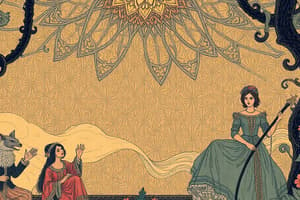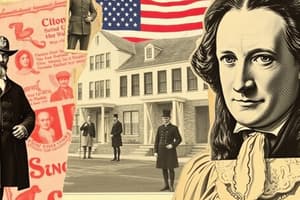Podcast
Questions and Answers
Who was the Governor of the Indiana Territory that fought against Tecumseh?
Who was the Governor of the Indiana Territory that fought against Tecumseh?
- John C. Calhoun
- James Monroe
- William Henry Harrison (correct)
- Andrew Jackson
Who wrote 'The Star Spangled Banner'?
Who wrote 'The Star Spangled Banner'?
Francis Scott Key
Who was the seventh President of the United States?
Who was the seventh President of the United States?
Andrew Jackson
Which author is known for 'Rip Van Winkle' and 'The Legend of Sleepy Hollow'?
Which author is known for 'Rip Van Winkle' and 'The Legend of Sleepy Hollow'?
What doctrine did James Monroe proclaim?
What doctrine did James Monroe proclaim?
What is James Fenimore Cooper best known for?
What is James Fenimore Cooper best known for?
Who was the Chief Justice of the Supreme Court from 1801 to 1835?
Who was the Chief Justice of the Supreme Court from 1801 to 1835?
What was John C. Calhoun's role in relation to the Fugitive Slave Law?
What was John C. Calhoun's role in relation to the Fugitive Slave Law?
Who served as Secretary of State and was involved in the Adams-Onis Treaty?
Who served as Secretary of State and was involved in the Adams-Onis Treaty?
What was the outcome of McCulloch v. Maryland?
What was the outcome of McCulloch v. Maryland?
What was the significance of Gibbons v. Ogden?
What was the significance of Gibbons v. Ogden?
What battle effectively ended the Creek War?
What battle effectively ended the Creek War?
What power did the Supreme Court assert in Fletcher v. Peck?
What power did the Supreme Court assert in Fletcher v. Peck?
What significant college case did the Supreme Court decide in 1819?
What significant college case did the Supreme Court decide in 1819?
What does the Era of Good Feeling refer to?
What does the Era of Good Feeling refer to?
What was the Missouri Compromise about?
What was the Missouri Compromise about?
What was discussed in the Hartford Convention?
What was discussed in the Hartford Convention?
What event did the Treaty of Ghent conclude?
What event did the Treaty of Ghent conclude?
What did the Tallmadge Amendment propose?
What did the Tallmadge Amendment propose?
What is the definition of the Monroe Doctrine?
What is the definition of the Monroe Doctrine?
What was the Land Act of 1820?
What was the Land Act of 1820?
In which battle did Tecumseh die?
In which battle did Tecumseh die?
What does the term 'Constitution' refer to?
What does the term 'Constitution' refer to?
What was the Florida Purchase Treaty?
What was the Florida Purchase Treaty?
What caused the panic of 1819?
What caused the panic of 1819?
What was the significance of the Treaty of 1819?
What was the significance of the Treaty of 1819?
Who were the presidents from the Virginia dynasty?
Who were the presidents from the Virginia dynasty?
What was the Bonus Bill of 1817?
What was the Bonus Bill of 1817?
What did the Tariff of 1816 aim to do?
What did the Tariff of 1816 aim to do?
What was the function of the Second Bank of the United States?
What was the function of the Second Bank of the United States?
What was Ohio fever?
What was Ohio fever?
What does isolationism mean?
What does isolationism mean?
Flashcards are hidden until you start studying
Study Notes
Key Figures in American History
- William Henry Harrison: Governor of Indiana Territory; known for defeating Tecumseh at the Battle of Tippecanoe.
- Francis Scott Key: Lawyer and poet; wrote "The Star Spangled Banner" after witnessing the British attack on Baltimore.
- Andrew Jackson: Seventh U.S. President (1829-1837); defeated the British at the Battle of New Orleans; increased presidential powers and opposed the national bank.
- Washington Irving: Prominent author and diplomat; creator of “Rip Van Winkle” and “The Legend of Sleepy Hollow”; first American author recognized in England.
- James Monroe: Fifth U.S. President; known for the Monroe Doctrine, which opposed European colonization in the Americas.
- James Fenimore Cooper: Notable American novelist; famous for “The Last of the Mohicans,” exploring frontier life.
- John Marshall: Long-serving Chief Justice (1801-1835); instrumental in shaping U.S. law through landmark cases.
- John C. Calhoun: Advocate for the Fugitive Slave Law; argued for the necessity of slavery in the South based on class hierarchies.
- John Quincy Adams: Sixth U.S. President and Secretary of State; key figure in the Adams-Onis Treaty and the Monroe Doctrine.
Significant Supreme Court Cases
- McCulloch v. Maryland: Established federal supremacy; Maryland attempted to tax the national bank.
- Cohens v. Virginia: Affirmed the Supreme Court's authority to review state court decisions.
- Gibbons v. Ogden: Expanded interpretation of interstate commerce through a steamboat case.
- Fletcher v. Peck: Established the Court's power to declare state laws unconstitutional.
- Dartmouth College v. Woodward: Protector of corporate charters under the contract clause of the Constitution.
Wars and Conflicts
- Battle of Horseshoe Bend: Fought in 1814; decisive victory for Andrew Jackson against Creek Indians, ending the Creek War.
- Battle of Plattsburgh: Significant victory for American forces during the War of 1812.
- Battle of the Thames: Resulted in the death of Tecumseh, effectively ending the Indian confederation.
Treaties and Policies
- Treaty of Ghent: Ended the War of 1812, restoring prewar boundaries.
- Florida Purchase Treaty (Adams-Onis Treaty): Spain ceded Florida to the U.S.; U.S. dropped claims to Texas.
- Monroe Doctrine: Foreign policy statement asserting that Europe should not interfere in Western Hemisphere affairs.
Important Legislative Actions and Events
- Era of Good Feeling: Period marked by political unity during Monroe's presidency.
- Missouri Compromise: Compromise addressing the extension of slavery into new territories.
- Hartford Convention: Meeting of Federalists during the War of 1812, viewed as traitorous and weakening the party.
- Tallmadge Amendment: Proposed gradual emancipation of slaves in Missouri, perceived as a threat to sectional balance.
- Land Act of 1820: Authorized purchasing land at a minimal price, facilitating western expansion.
- Panic of 1819: Post-war economic depression attributed to overproduction and mismanaged national banking.
Economic Policies and Concepts
- Tariff of 1816: Protective tariff aimed at helping American industries post-war.
- Second Bank of the United States: Chartered in 1816; became a source of controversy and opposition, notably from Andrew Jackson.
- Ohio Fever: Phenomenon where European immigrants purchased large tracts of inexpensive land in America.
General Concepts
- Constitution: Written framework of government in the United States.
- Isolationism: Policy of non-involvement in international economic and political relations.
Studying That Suits You
Use AI to generate personalized quizzes and flashcards to suit your learning preferences.




